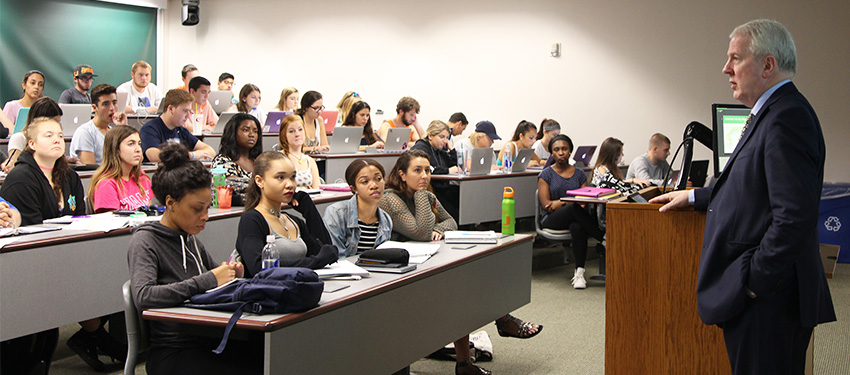David Jordan, the director of editorial policy and standards at the BBC, met with students and faculty this week to discuss news and the media. Jordan’s visit to the University of Miami was made possible by the School of Communication’s London Summer study abroad program. Students who are a part of this program will meet with Jordan again in London, where he will show them the news room of the BBC, as well as introduce them to editors and reporters and teach them about the business side of broadcasting.
While giving a general overview of all of the BBC’s operations, Jordan listed a number of channels that the BBC provides, including a 24-hour news channel, two channels that are geared toward children, and a parliamentary channel that shows live coverage of the houses of parliament.
The BBC also provides several radio stations. According to Jordan, radio channels tend to be specific because radio audiences are more segmented. The BBC’s radio stations vary from drama radio to classical music to pop music. Radio 1 is a channel that is aimed toward younger people and, Jordan says, station employees do a lot of innovative work to find new artists, one of those being Adele.
“She just came back and did an hour concert for us, which we will show in a week or two,” Jordan said.
Overall, the BBC has nine nationwide television channels, 15 nationwide radio stations, including six radio stations across Scotland, Wales, and Northern Ireland, including local language, and around 40 local radio stations in different parts of England. The BBC also provides BBC World News, a comprehensive online content service, BBC iPlayer, which provides simulcasts of BBC content, and world service on radio, television, web, and mobile in 28 languages around the world.
“We’re trying to offer value in a slightly different way from commercial transmitters,” Jordan said. “We’re not just interested in making money out of these things. We’re interested in reflecting the latest in pop culture, in music culture, and satisfying all kinds of different audiences.”
Jordan described the BBC as a “massive organization with huge reach in its home base.” According to Jordan, 97 percent of the United Kingdom’s population consumes media provided by the BBC, whether through television, radio, or online. Their media consumption totals about 18.3 hours per week.
Jordan credits the BBC’s success to its reputation of independence. He noted that there is no advertising on any of the BBC’s services, which allows the BBC to be commercially independent.
“That’s something [our audience] really values, that they don’t get interrupted,” Jordan said.
The BBC is also politically independent, Jordan said, by reporting accurately and not being known for leaning toward one political party.
In terms of the future of the BBC, the focus is on youth and the way they consume media. Since a lot of media consumption is now through social media, the BBC now puts their material on sites such as YouTube and Facebook.
“All of the broadcasters I know around the world are obsessed with how to reach younger audiences because consumption habits are changing so radically,” Jordan said.
As director of editorial and policy standards, Jordan highlighted several standards that the BBC tries to maintain: bringing the UK to the world and the world to the UK; representing the UK, its nations, regions, and communities; being independent and impartial; sustaining citizenship and civil society; promoting education and learning; stimulating creativity and cultural excellence; and delivering to the public the benefit of emerging communications technologies and services.







